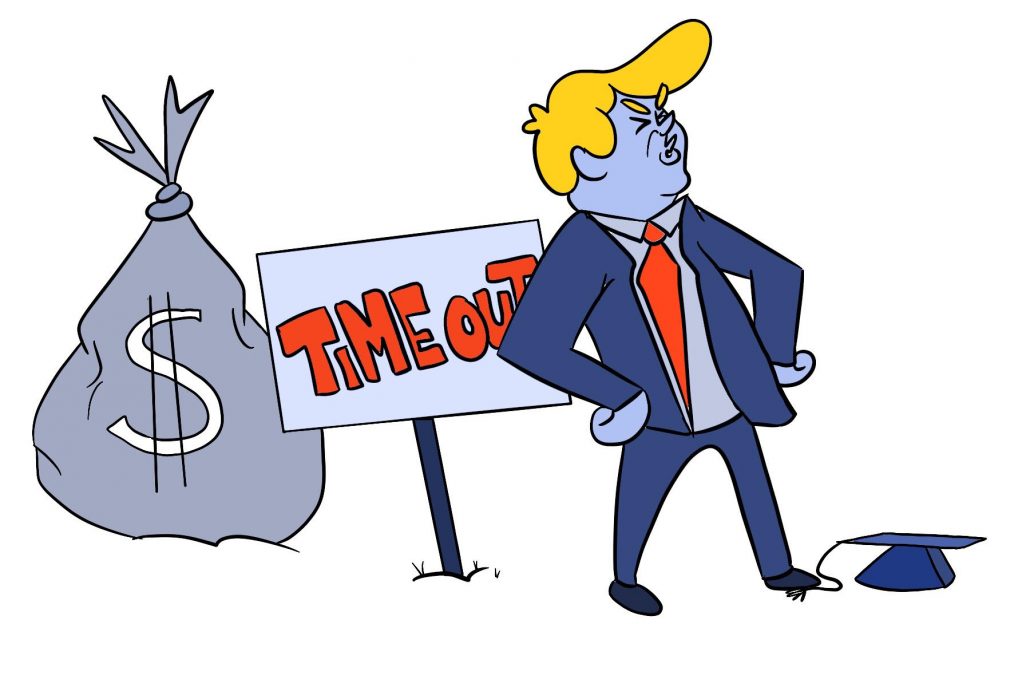OPINION: Trump shutdown unfairly affects higher education

As the U.S. government enters its third week of shutdown, federal workers and agencies are facing the reverberations of unpaid work, furloughed employees and funding slashes. But among the institutions affected by the shutdown, those in charge of distributing funding for research and higher education are unable to support universities like USC.
Nearly 800,000 federal employees cannot work with pay during the shutdown. Groups like the National Science Foundation, the National Endowment for the Humanities and NASA are unable to operate without a staff. Because these agencies are responsible for disbursing federal grants to research universities, the government shutdown throws major projects into jeopardy.
In 2018, the NSF allocated more grants to California than to any other state, and USC has been a frequent beneficiary of those allocated grants. In 2017, a record 24 members of USC’s graduating class received NSF’s prestigious Graduate Research Fellowship.
The Viterbi School of Engineering’s NSF Research Traineeship program alone disperses approximately $36,100,000 through grants for graduate student researchers. But applications for these grants cannot be processed and, because of the shutdown, money has yet to be distributed.
In addition to the NSF, USC students and researchers also receive funding from the NEH, which funds summer stipends of up to $6,000 for any faculty member pursuing research in the humanities. It also funds challenge grants of up to $750,000 for universities to develop greater infrastructure in their humanities curriculum. However, NEH has also experienced severe shutdown consequences. As a result, students and researchers who could have benefitted from hundreds of thousands of dollars in funding for their projects can no longer do so.
Beyond research, a federal shutdown means that the Department of Education cannot provide essential oversight and support for universities. For example, the Education Department is unable to continue its investigations into university civil rights cases during the shutdown. Catherine Lhamon, the department’s former assistant secretary for civil rights, reported to Inside Higher Ed that during the 16-day shutdown of the Obama administration, the Office of Civil Rights could not conduct their investigations nor reclaim any money and time that was lost during that time period.
In a memo about the government shutdown, Secretary of Education Betsy DeVos warned that programs supporting disadvantaged students rely heavily on government funding. With 90 percent of the department’s workforce on unpaid leave, federal support for low-ncome students is stalled.
The money that students in need rely on — Pell grants, direct student loans — have been disbursed and allocated for some time to come, but if the shutdown persists, edits to or requests for additional funding may become unavailable if there are not enough employees to process these changes. Students will be unable to procure the assistance they need to continue attending school, affecting their future plans and university enrollment.
President Donald Trump’s perspective on the federal shutdown is narrow-minded. It focuses only on the partisan divide and neglects the government’s broad range of responsibilities. When speaking of those affected directly by the shutdown, Trump focused heavily on their political affiliations rather than the effect their jobs have on society.
He has failed to demonstrate a basic understanding not only of workers whose daily lives have been disrupted, but also of the magnitude of its consequences.
Trump’s actions have a much greater reach than he realizes. Getting the government running again is not just a matter of partisan divide over a border wall; it is a matter of success or failure for researchers and agencies alike.

